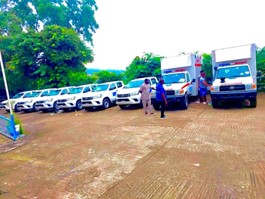By Ellen Samura
The World Health Organization (WHO) Sierra Leone last Friday donated six brand-new utility vehicles/double cabin pick-ups and two fully equipped ambulances to the Ministry of Health and Sanitation to enhance the country’s ability to respond effectively to public health emergencies.
While presenting the donation to the country’s health minister Dr. Austin Demby, WHO Country Representative Dr. Innocent Nuwagira said that the growing public health concerns in Africa are a stark reminder of the urgent need to build and sustain robust national capacities for preparedness, detection, and response to threats, citing the Covid-19 pandemic and the ongoing Mpox outbreak as classic examples.
“This donation is part of WHO’s commitment to bolster the ministry’s capacity to ensure rapid readiness and response to public health emergencies in any region of the country,” Dr. Nuwagira said.
He also mentioned that WHO in collaboration with the Africa Centre for Disease Control have recently trained 72 public health emergency responders in emergency management, adding that these trainees are now ready for deployment within 48 hours of any emergency notification in the country.
Dr. Nuwagira further explained that the World Health Organisation has prioritised health security through its Emergency Preparedness and Response (EPR) flagship initiative which, according to him, aligns with global strategies designed to accelerate investments in critical areas of health security across the African region. This initiative, he said, focuses on three broad components:
- Promoting Resilience of Systems for Emergencies (PROSE): This component helps countries address gaps in the International Health Regulations (IHR) and build resilience to anticipate, plan, and prepare for known and emerging threats.
- Transforming African Surveillance Systems (TASS): This component focuses on strengthening integrated surveillance systems to enable faster detection of public health events and timely response.
- Strengthening and Utilizing Response Groups for Emergencies (SURGE): This component involves strengthening integrated surveillance systems to enable faster detection of public health events and timely response.
Upon receiving the donation, Sierra Leone’s health minister Dr. Austin Demby described the occasion as remarkable, stating that the vehicles will significantly aid the country’s disease prevention, preparedness, and response mechanisms. He assured the WHO rep that these resources would be meticulously documented and accounted for and used for its intended purpose.
According to Dr. Nuwagira, WHO is dedicated to supporting Sierra Leone in building a resilient health system capable of effectively responding to public health threats.

“WHO remains dedicated to supporting Sierra Leone in building a resilient health system that can effectively protect its people and respond to public health threats.” — Dr. Innocent Nuwagira, WHO country rep, Sierra Leone





